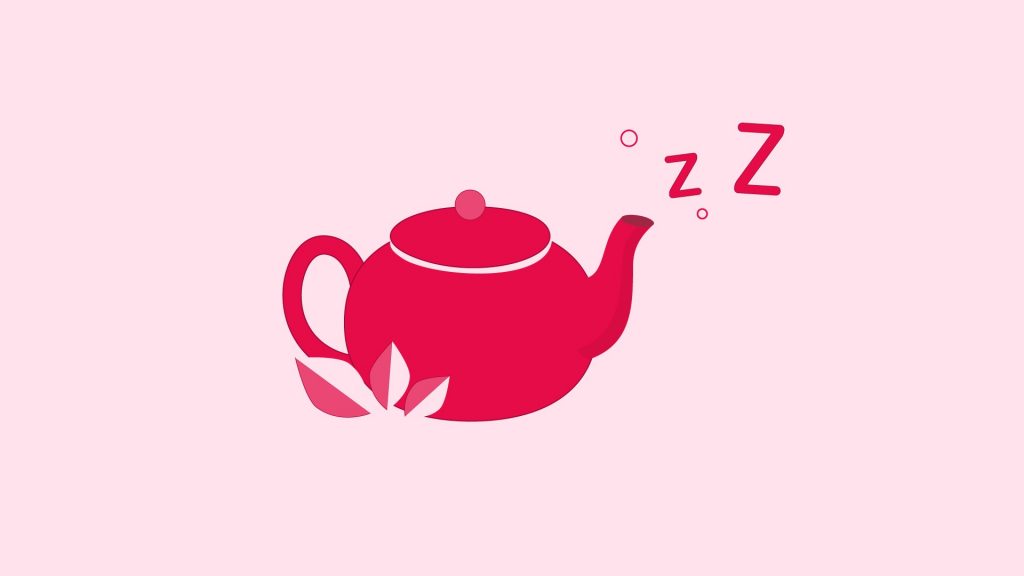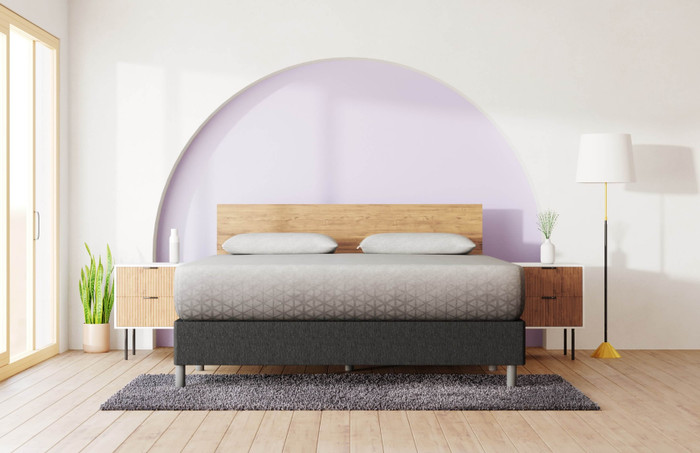7 Best Teas for Sleep

Adequate sleep is vital for productivity, mental clarity, stress management, and overall health. Unfortunately, the worries and anxieties of everyday life are keeping millions of Americans from getting proper rest. Instead of turning to over-the-counter and prescription medications to improve sleep, there are several natural sleep aids that can help. Herbal tea is one of the most effective ways to relax and reduce stress before bedtime. Plus, it is caffeine-free, completely natural, and comes with many health benefits.
If you are looking for a healthy way to fall asleep quickly, we outline 7 of the best teas for sleep. We also highlight how each tea promotes relaxation and alleviates stress before bed.
1. Chamomile Tea
For centuries, chamomile tea has been revered for its calming effect on the body, making it a common recommendation for those with insomnia. The reason chamomile is an effective bedtime tea is that it contains a flavonoid and antioxidant called apigenin. Apigenin binds to the benzodiazepine (BDZ) and gamma-aminobutyric acid (GABA) receptors in the brain, which calms the central nervous system and has a mild sedative effect on the mind and body.
Although there are very few clinical studies to support chamomile’s use as a sleep aid, a 2017 study shows that chamomile effectively promoted sleep in 60 elderly patients. These individuals were given 400 mg of chamomile extract each day. After two weeks, these patients reported better sleep quality than those who were given a placebo.
2. Lavender Tea
Lavender is known for its calming and pleasant scent. This herb is often used in bath products and candles to promote tranquility and relaxation. However, many people may not realize that the small purple lavender flowers can be used to make tea.
In addition to its aromatic properties, lavender also contains silexan. Through steam distillation, silexan oil is derived from lavender flower tops. Although research still new, one study found silexan oil could decrease anxiety and improve sleep quality.
3. Valerian Root Tea
Like chamomile, valerian root is widely considered to be a natural and effective sleep aid and anti-anxiety treatment. Although valerian root can be found in liquid and capsule form, valerian tea is the most common way to consume this dried root.
Researchers believe valerian’s ability to increase GABA levels is the reason it promotes sleep and relaxation. High levels of GABA neurotransmitters have been shown to cause sleepiness.
A study from 2000 found that 600 milligrams of valerian extract had a similar effect to 10 mg of oxazepam, a commonly prescribed sleep aid used to combat symptoms of insomnia and other sleep disorders. However, participants who took valerian did not experience any of the side effects typically associated with oxazepam, such as daytime drowsiness.
4. Lemongrass Tea
Lemongrass tea has a fruity, light, and airy flavor. When consumed regularly, it has been shown to regulate the sleep schedule, lengthening sleep duration, and decrease anxiety.
Experts believe lemongrass tea is an effective sleep aid because it helps trigger the release of serotonin, the hormone responsible for improving mood and promoting feelings of contentment. If you suffer from restlessness or racing thoughts before bed, lemongrass tea can help lower cortisol levels (the stress hormone), so you don’t miss out on valuable sleep.
5. Passionflower Tea
Passionflower is a flowering vine that has a mild earthy flavor when dried and steeped in tea. This plant has over 500 species and has many benefits, including relaxation, better sleep, mood enhancement, and pain relief.
Several studies show that passionflower, like valerian root, naturally increases the presence of GABA in the brain. GABA, the amino acid responsible for decreasing activity in the central nervous system, helps promote relaxation and reduce anxiety. In fact, one study involving 40 adults found that those who drank passionflower tea every day for 1 week reported better quality sleep.
6. Lemon Balm Tea
Since the Middle Ages, lemon balm leaves have been dried and used to make a soothing, aromatic tea. Although this herb is part of the mint family, it has a citrus scent and taste many people find calming.
A 2011 study revealed that patients with a mild-to-moderate anxiety disorder and sleep disturbances showed signs of improvement when taking Cyracos®, a standardized lemon balm extract. Throughout the 15-day study, patients experienced an 18 percent reduction in anxiety-related symptoms and a 42 percent decrease in insomnia related symptoms.
7. Peppermint Tea
Peppermint tea is known for being a safe, non-toxic aid for digestive issues, including bloating, an upset stomach, and indigestion. However, peppermint is also an effective sleep aid. Its anti-inflammatory properties have been shown to promote muscle relaxation and increase drowsiness. If you suffer from chronic acid reflux or GERD, a cup of peppermint tea can help soothe the esophagus and promote relaxation.
For pregnant women who frequently experience indigestion and heartburn at night, peppermint tea can also help alleviate these symptoms and encourage sleep.
Frequently Asked Questions
What vitamins and minerals are good for sleep?
The best vitamins and minerals for sleep include vitamin D, calcium, and magnesium. Vitamin D receptors are located in the part of the brain that regulates sleep. Calcium helps the body process the amino acid tryptophan, which is needed for melatonin production. Magnesium naturally promotes muscle relaxation and helps activate the neurotransmitters associated with calming the mind and body.
Which tea has the most caffeine?
Herbal teas, such as the ones described above, do not contain caffeine. However, black tea, green tea, and white tea do contain low levels of caffeine. Eight ounces of black tea typically contains around 42 mg of caffeine, while green tea contains around 25 mg and white tea contains 28 mg of caffeine. This is considerably low compared to coffee, which contains about 108 mg of caffeine per eight ounces.
To get the benefits of these teas without the caffeine, we suggest opting for decaf versions.
Is green tea good for sleep?
Green tea has many health benefits. It contains l-theanine, a compound known to increase feelings of calm and relaxation while decreasing anxiety. However, unlike many herbal teas, green tea does not cause extreme fatigue or drowsiness.
What tea is good for anxiety?
Teas that promote sleep and relaxation, such as valerian, lavender, lemongrass, and passionflower, naturally decrease stress and anxiety. For best results, experts suggest drinking at least 1 cup of herbal tea every day. For better quality sleep, be sure to consume tea at least 1 hour before bedtime.
Since some medications can change the effects of herbal teas, it is important to discuss tea consumption with your doctor first.
What foods promote sleep?
Several foods promote sleep and relaxation. Almonds, for example, contain melatonin, the hormone responsible for regulating the sleep-wake cycle. Bananas contain magnesium, which has been shown to promote muscle relaxation and reduce anxiety. The following list includes foods that have been known to increase drowsiness.
- Almonds
- Milk
- Bananas
- cherries
- Rice
- Walnuts
- Honey
- Oats
- Turkey
- Sweet potatoes
- Herbal teas
Did We Help?
Prescription sleeping pills come with many dangerous side effects, such as changes in appetite, dry mouth and throat, headaches, dizziness, and tingling in the hands, feet, and legs. Although they may effectively promote sleep, many patients who rely on these sleep aids often experience daytime sleepiness and a lack of productivity.
Herbal teas can help sleepers avoid these harmful symptoms and still get a good night’s sleep. Plus, many of the teas on our list, including chamomile and lemon balm, have antioxidant properties that can help cleanse the body of toxins and decrease the risk of developing cancer.
This article is for informational purposes and should not replace advice from your doctor or other medical professional.
James Nguyen, Sleep Expert 
James Nguyen is Zoma's resident sleep expert and staff writer. James enjoys learning about the newest technologies in the mattress industry and doing deep dives into the science of sleep. He's tried nearly every gadget and gizmo in an effort to determine which sleep-promoting accessories can truly enhance your shut-eye. Outside of work, James takes his dedication to get healthy sleep seriously, and has even declared himself an "expert napper." James' research has been featured on Thrive Global and other media.
View all posts

